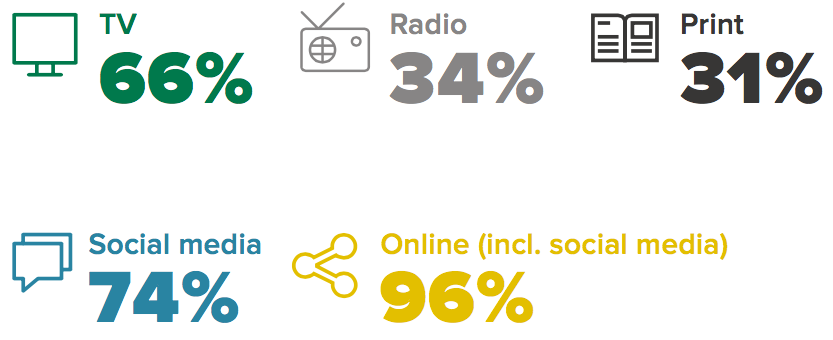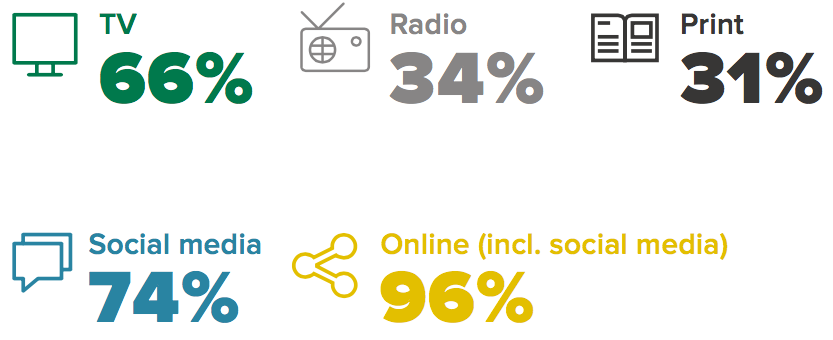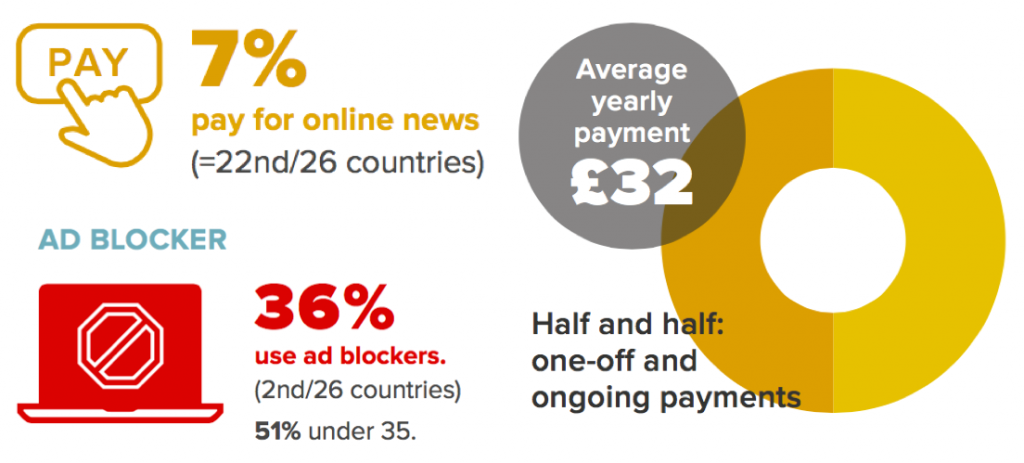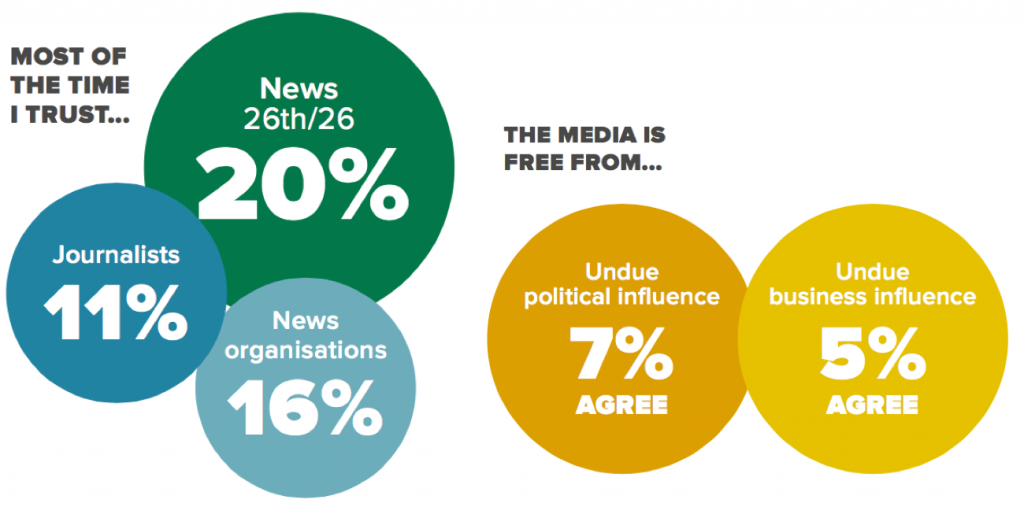| Statistics | |
| Population | 11m |
| Internet penetration | 63% |
The media market in Greece is characterised by low trust and low use of traditional media (including a weak newspaper market) alongside some of the highest use of social media and digital-born outlets in our study.
Top Brands % Weekly Usage (TV, Radio and Print)
| Weekly use | Main source | |
|---|---|---|
| Alpha TV news | 50% | 13% |
| Skai news (inc. radio) | 48% | 17% |
| ANT1 news | 44% | 10% |
| Mega news | 43% | 9% |
| ERT news | 38% | 14% |
| Star news | 38% | 7% |
| Real news | 20% | 8% |
| Real 97.8 FM news | 19% | 2% |
| Proto Thema | 17% | 2% |
| Epsilon news | 15% | 1% |
| Kathimerini | 14% | 2% |
| To Vima | 13% | 1% |
| BBC News | 13% | 2% |
| Ta Nea | 12% | 0% |
| CNN | 11% | 1% |
| Makedonia TV | 8% | 0% |
Top Brands % Weekly Usage (Online)
| Weekly use | Main source | |
|---|---|---|
| Newsbomb.gr | 34% | 6% |
| In.gr | 33% | 7% |
| Zougla.gr | 29% | 4% |
| Enikos.gr | 28% | 7% |
| News247.gr | 28% | 4% |
| Yahoo News | 27% | 7% |
| Newsit.gr | 25% | 5% |
| Skai News online | 25% | 4% |
| Proto Thema online | 24% | 3% |
| tro-ma-kti-ko.blogspot.com | 24% | 2% |
| Kathimerini online | 22% | 2% |
| Lifo.gr | 20% | 3% |
| Naftemporiki Online | 20% | 2% |
| Capital.gr | 19% | 3% |
| Newsbeast.gr | 19% | 3% |
| Mega online | 19% | 2% |
Overview of key developments
By Antonis Kalogeropoulos
Research Fellow, Reuters Institute for the Study of Journalism
The Greek media system has been hit hard by the financial crisis. As one example, the financial turnover for television production in 2015 was half of what it was in 2010. 1
In the television market, the old brand name for the Public Service Broadcaster (ERT) made a comeback in 2015 replacing the previous government’s attempt to rebrand it as NERIT. Despite the turmoil and constant relaunches, ERT news is still accessed weekly by over a third (38%) of respondents and is the main source of news for 14%. In the private TV news landscape, both the survey data and TV ratings [72. http://www.arianna.gr/gr/data/ show that ALPHA news viewership is now strong, surpassing ANT1 and MEGA which have been the two biggest broadcasters since the launch of private TV in Greece, 26 years ago. In addition, SKAI, a broadcaster that took an open political stance during the recent referendum and covered the political developments of 2015 extensively, has built a loyal core audience. While the percentage of Greeks using TV as their main news source is the lowest in the 26 countries (21%), 66% still use it for news, with low numbers recorded partly due to our use of an online panel.
In the newspaper market, the most successful Sunday newspapers today are (at least partly) published by journalists known mainly from television Proto Thema and Real News). Older legacy newspapers like Kathimerini and To Vima are lagging behind. The pattern is repeated in radio news where legacy SKAI radio is trailing Real FM.
In online news, digital-born news portals like newsbomb.gr and news247.gr are often the first port of call, while feisty and controversial blogs like tro-ma-ktiko.blogspot.com attract significant audiences. Although this may suggest significant disruption, many of these portals are also published by traditional journalists who made their reputation during the successful age of private television (like zougla.gr, enikos.gr, or newsit.gr). In.gr, the news portal of the DOL conglomerate that was for many years the biggest in the Greek market, remains quite successful. The websites of some financial newspapers (capital.gr and naftemporiki.gr) attract influential audiences, as a result of
the importance of economic news in today’s Greece.
The sharp fall in newspaper circulation, the low figures for paying for online news, and the very high figures for ad-blocking software (the second highest in our survey) portray a gloomy picture for publishers in Greece. All these developments go hand in hand with the low trust in journalists and news organisations, which in turn mean that many Greeks feel that news is not something they have to pay money for. As a result Greeks tend to read news in social media at higher rates than other countries.
News participation of Greeks in social media (in terms of sharing or commenting news) is also high, an indication that social networking sites are seen as a tool of expressing opinions and feelings during the ongoing political and economic turmoil.
Paying for news
Most online news remains free at the point of consumption and the economic crisis makes it even harder to charge for content than elsewhere. Few newspapers operate paywalls in Greece.
Trust
Trust in journalism and media organisations in Greece is the lowest of the 26 countries surveyed. Greeks feel that many journalists and news organisations were closely connected to political and business corruption and thus are viewed as partly responsible for the extent of
the financial crisis.
Scroll data area to see more
TOP SOCIAL NETWORKS*
| RANK | NETWORK | ALL | U35s |
|---|---|---|---|
| 1 | 68% | 69% | |
| 2 | YouTube | 34% | 32% |
| 3 | 14% | 11% | |
| 4 | Viber | 8% | 10% |
| 5 | Google+ | 8% | 6% |
- https://www.statistics.gr/el/statistics/-/publication/SDD06/-%5d The newspaper industry, which was never as strong in Greece as in Northern Europe, has also faced strong pressures, and the average circulation for Sunday newspapers has also halved since 2009. [71. http://www.argoscom.gr ↩




